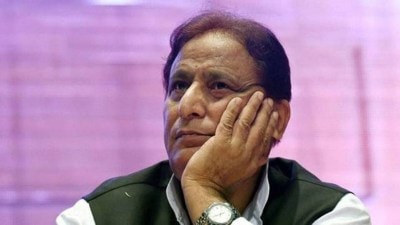Why is Governor sitting on Bills, asks SC; may take up Kerala plea for norms
A three-judge bench presided by Chief Justice of India D Y Chandrachud, which took up a plea by the state government accusing Governor Arif Mohammed Khan of not acting on some Bills sent to him by the state assembly, asked: “What is the Governor doing for two years sitting tight on these Bills?”
 The top court permitted the Kerala government to amend its plea seeking issuance of guidelines for state governors to grant or decline assent to bills passed by legislatures in a time-bound manner. (Express photo)
The top court permitted the Kerala government to amend its plea seeking issuance of guidelines for state governors to grant or decline assent to bills passed by legislatures in a time-bound manner. (Express photo)The Supreme Court Wednesday said it will look into the Kerala government’s request to consider laying down guidelines as to when the Governor of a state can reserve bills for the consideration of the President.
A three-judge bench presided by Chief Justice of India D Y Chandrachud, which took up a plea by the state government accusing Governor Arif Mohammed Khan of not acting on some Bills sent to him by the state assembly, asked: “What is the Governor doing for two years sitting tight on these Bills?”
The bench, which favoured Attorney General R Venkataramani’s idea for a meeting between CM Pinarayi Vijayan and the Governor to sort out differences, also asked the state if the petition was to settle “a political score or to find a solution”.
“Let’s hope some political sagacity takes over at this stage. That’s what we expect. And if that happens, it may not be necessary for us to lay down guidelines… Otherwise we are here to lay down the law under the Constitution,” the CJI said. The court allowed the state to amend its petition so as to include the “broader” reliefs it wanted.
Appearing for the state government, senior advocate K K Venugopal told the bench that the Governor had given assent to one of eight Bills that had been pending and had reserved the remaining seven Bills for the President’s consideration under Article 200 of the Constitution. “No reasons given why. This is wholly uncalled for and is only an attempt to delay the whole matter,” he said.
Explaining this further, Venugopal referred to Article 213 of the Constitution which deals with the power of the Governor to issue an ordinance and said that provision to the Article mentions when he has to take the President’s instructions before promulgating it. “If any of those conditions existed, he had to take the instructions of the President. But no instructions were taken for the simple reason he didn’t believe that any of the conditions arose in the matter,” he said.
Venugopal said that “there is no single power under the constitution vested in any authority which is arbitrary because the constitution by its entire requirements would say that Article 14 applies to any action. To render it non-arbitrary it is essential that he gives reasons. If he is referring to the President, he has to necessarily say why. He can’t blindly take 7 bills and present them to President.”
He told the court that it was time the court laid down some guidelines “as to when would the Governor reserve a Bill for the consideration of the President, as to when would you refuse sanction and as to when would you send it back with a message. Unless these are laid down now, there is a carte blanche so far as Governors are concerned and Governance of state is suffering.”
The AG said the Governor had taken action and added that the scope of the petition could not be further expanded. The AG said, “there is no act of the Governor which is not justiciable…You can’t convert a petition like this into a continuing mandamus.”
Initially, the bench also said that “we don’t have any such controversy before us at this state, can’t enlarge…we cant convert this petition into a roving enquiry” but went on to allow the state to amend the petition to seek the reliefs. As the AG suggested that the CM and Governor meet and resolve the matter, Venugopal said the minister in charge who moved the respective bill has met the Governor “but this is face saving to say that the Chief Minister who has not moved the Bill should go and meet him”.
He added that only the minister in charge who has moved the bill knows what are the issues that exactly arise. “The CM would not know that.”
The CJI however said, “the CM is the head of the cabinet. He can’t say I don’t know.”
The court suggested that the CM as well as the Minister in charge go and visit the Governor if the latter invites them and asked Venugopal to accordingly advise the CM.







